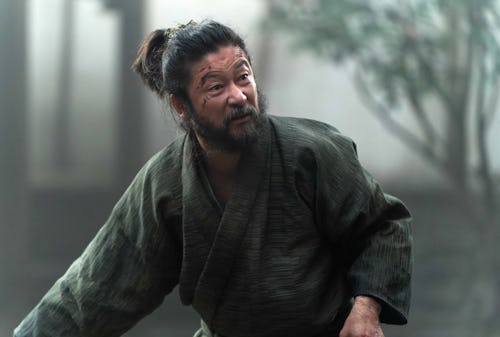
Not since Marvel’s Loki has there been a lovable scoundrel quite like Yabushige in Shōgun. But ask the man himself, ex-rocker and screen actor Tadanobu Asano, and he can’t tell you why or how that even happened.
“Honestly, I’ve been surprised by the reception of the audience,” Asano tells Inverse over Zoom, speaking through an English interpreter. (While interpreters are common industry practice when language barriers are involved, this particular experience conjured up echoes of FX’s Shōgun itself, an epic drama about communication.) “Before the show started airing, I was a little worried about what was going to happen, how people would see him. But it’s been a happy surprise.”
Throughout all 10 episodes of Shōgun, based on James Clavell’s dense historical fiction novel, Yabushige is a two-timing samurai noble playing his own game of thrones with other powerful lords, or daimyo, of Japan in the year 1600. Back when the deeply isolationist country engaged only with Portuguese Catholic missionaries, an English sailor named John Blackthorne (Cosmo Jarvis) washes on its shores and sparks something of a political panic.
Amid the civil war brewing among those who seek the title of shōgun, Yabushige schemes to claim his slice of wealth without getting his head sliced off. Still, and maybe because of Asano’s delectable performance, audiences have fallen for Yabushige. Between his palpable frustrations trying to curry favor with whoever might end up shōgun, and his signature expressions of phlegmy grunts and shocked faces, it’s hard not to like the man.
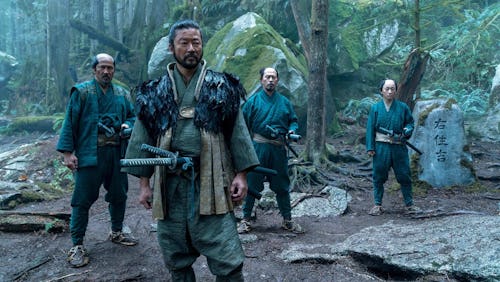
Yabushige is brought to life by the 50-year-old Asano, who started his career in his native Japan both as an actor (his first role in the teen soap opera Kinpachi-sensei, a sort of Japanese Degrassi) and a musician in the avant-garde punk group MACH 1.67 (he plays guitar). After amassing recognition in his homeland through films like the grindhouse classic Ichi the Killer, the samurai blockbuster Zatoichi, and the quirky comedy The Taste of Tea, Asano has made headway in Hollywood. He played a bit part in Marvel’s Thor franchise as Hogun, a compatriot of Chris Hemsworth’s hammer-wielding Avenger; he was unceremoniously killed off by Cate Blanchett in Thor: Ragnarok. He more recently lit up the screen as his own God of Thunder, Raiden, in the 2021 feature Mortal Kombat. (He will return for Mortal Kombat 2.)
While Hollywood films have yet to fully embrace Asano, his recognition post-Shōgun has without question drawn more eyeballs his way. In a conversation with Inverse, Asano recaps the final days of Yabushige, as well as a look into his own experiences as an outsider in Hollywood — a theme that perfectly suits the tone of this quiet, careful, one-of-a-kind TV drama.
This interview has been edited for clarity. Spoilers for Shōgun ahead.
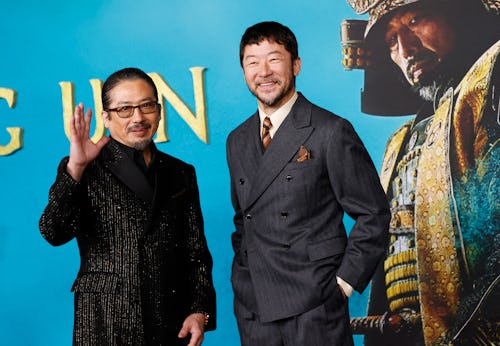
Let’s talk about the finale. When Toranaga orders Yabushige to commit seppuku, Yabushige insists there are better ways to die, like being ripped apart by cannons or eaten by fish. What is Yabushige actually saying here? Why is Yabushige insisting on these graphic, gruesome deaths over seppuku?
For Yabushige, he’s in a world where there is Toranaga, or anyone higher than him, that he has to follow. I think what he was trying to say, and also ask, was, “Why was I born in [this] period? In these circumstances? Why am I to follow the orders of those high up?” I think he was trying to find a choice. Does he have a choice within the constraints of the world he was born into?
When Toranaga asks Yabushige who shall be his second in seppuku, I found it interesting that Yabushige requests Blackthorne first. Why do you think he chose Anjin over Toranaga, or even someone personally closer to him like Omi?
I think that Yabushige, honestly, is purer than a child. And in that moment, as far as who he felt close to, was Anjin who he is very entertained by, and there is an understanding between them. I think having that close connection with Anjin in that moment, he instantly chose someone he feels close to.
Yabushige tried, and ultimately failed, to play both sides. But there were times where I was convinced that Yabushige still felt close to Toranaga even in the end. What is your understanding of Yabushige’s relationship with Toranaga? Did Yabushige still think of Toranaga as a friend?
Yabushige is surrounded, and is in a world where everyone is chained down to something. Whether it’s customs or trying to become shogunate. So it doesn’t matter where they are in the hierarchy, everyone is chained down by something or someone. The word “friend” does include the word respect, [but] I think, no, Yabushige does not see Toranaga as a friend. As I mentioned, for his second in seppuku, he chooses Blackthorne and not Toranaga, and it’s because Yabushige sees Toranaga as, “You’re no fun.” He’s almost like a scary elder. “You’re supposed to be fun but you’re not fun anymore.” So in that way, they’re not friends anymore.
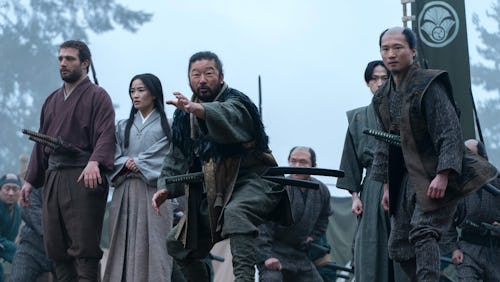
Yabushige is known for his grunting. There are fan-made compilations on YouTube of just Yabushige’s grunts. As an actor, what are the nuances of Yabushige’s grunting expressions? What is he trying to express when he’s just going, “agghh”?
I think the grunting nuance is partially just my breathing. But breathing in a sense of living as the character. In other roles I have added that in. It’s also just creating a moment to bridge other moments within the scene. Also, Yabushige doesn't catch himself. He doesn’t correct himself. He doesn’t pull back from that. He just expresses outwardly. I think the grunting is to bridge the moments between moments.
In an interview with Rolling Stone, executive producer Justin Marks said you improvised the scene where Yabushige calls Blackthorne a dog. What inspired that moment on set?
Of course as an actor, I am going to show up on the first day of set with a really fully-formed Yabushige. And of course you’re going to experience things during shooting that will add to the role. But I really plugged into what was real in that moment. I realized it was an important moment as well. Outside the freedom of not having to be locked into the script, that improvised moment is what I thought of. In that moment, that’s how that dialogue came about. You, Anjin, are in this country. You are pretty powerless and you have to do what we say. Therefore, you are like a dog who has to be taken around by his owner. That is what I truthfully felt in that moment.
I noticed that Yabushige’s act of seppuku is quick and sudden. Throughout the series we see dramatic forms of seppuku, with lots of preparation and formalized rituals. With Yabushige, he’s sitting casually before abruptly slitting his belly. What informed those choices for Yabushige in his very final moments?
In the script, all it said was “Yabushige commits seppuku,” and that was it. So at that point in the story, I proposed that kind of death for Yabushige. That was written and OK’d by Sanada and Justin, the EP. Hiromatsu has a great seppuku scene, and I instinctively knew that there had to be a difference between how they die. That’s how it came about.
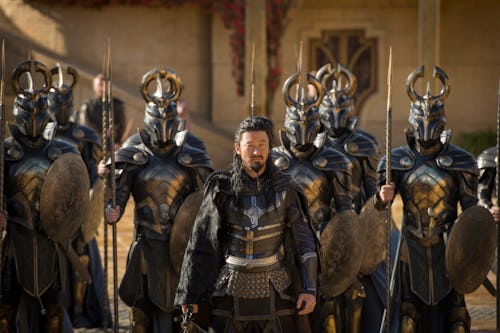
Shōgun isn’t the first major Hollywood production you’ve done. You were Hogun, one of Thor’s buddies, in the Marvel series. What was your experience working in that series? Do you think there could have been more for Hogun to do?
I love Hogun as well — I love that he’s stubborn. Knowing the Marvel universe, I’m hoping he gets revived… and that they’ll have a Hogun stand-alone spinoff to explore.
Many audiences will next see you return as Raiden in Mortal Kombat 2. What are you allowed to tell us about that movie? How much will Raiden be involved?
I had a lot of fun with the first Mortal Kombat, and Mortal Kombat 2 is just as fun. Raiden has a solid presence in the second movie, so I hope all the fans and everyone looking forward to it [enjoys it] when it hits theaters.
How would you describe working in the American entertainment industry, lately, as a Japanese actor? Is there a difference to how you are treated or the roles you audition for than when you first broke in over a decade ago?
I think I’ve been very lucky to have all these opportunities. When I’m on set, I can really feel the expectation of, How is this actor going to be entertaining for us? Of course it exists on Japanese sets too, but I really, really feel that on a U.S. set or non-Japanese set. I’m always thinking of, “Okay, how is this crew? And how can I make it interesting for this crew and also myself?” And that process, for me, has made me a stronger actor. The methods haven’t changed, but it’s always changing according to the project.
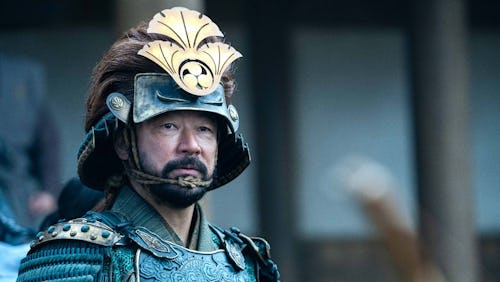
Historically speaking, Hollywood does not have the greatest history in portraying foreign cultures, especially Japan. Did you have any reservations at all being a native Japanese actor in an American production about historical Japan based on a book by an Australian-born British author? What concerns did you have, if any, and how were those concerns put to rest?
When the offer for Shōgun came in, I saw Hiroyuki Sanada was the producer, that dissipated any of my worries. We had a history of working together, and from the get-go with production, there was always a “Sanada presence” about the production, so that really just helped dissipate any worries I had.
Shōgun is streaming on Hulu.
FTTT
0 Comments